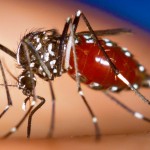 Wageningen University, part of Wageningen UR has developed a prototype vaccine against chikungunya in a joint effort with the Erasmus Medical Centre and TI Pharma. This prototype may hopefully lead to the first working vaccine against chikungunya, a geographically strongly expanding viral disease.
Wageningen University, part of Wageningen UR has developed a prototype vaccine against chikungunya in a joint effort with the Erasmus Medical Centre and TI Pharma. This prototype may hopefully lead to the first working vaccine against chikungunya, a geographically strongly expanding viral disease.
This mosquito-borne disease is characterized by symptoms such as acute fever, a conspicuous rash and debilitating, sometimes chronic, joint pain. The chikungunya virus originates from Africa but is now mostly affecting Asia and the Indian subcontinent where infectious tiger mosquitoes transmit the disease to humans, affecting an estimated 5–10 million people since its re-emergence in 2004.
The dramatic global expansion in the geographic distribution of the tiger mosquito has also resulted in small disease outbreaks of chikungunya in Europe. Scientists at Wageningen University and Erasmus Medical Centre have joined forces together with TI Pharma, allowing them to develop a vaccine for the disease.
This experimental vaccine produced at the Wageningen University consists of so-called virus-like particles. These nanoparticles are viral look-a-likes and elicit a potent immune response. However, these particles do not contain genetic material of the virus and are therefore non-infectious themselves. Animal experiments with these particles have shown protection against chikungunya replication and symptoms. The research group published their success in PloS Neglected Tropical Diseases. Stefan Metz, first author and PhD candidate at the Laboratory of Virology, will defend his thesis on the 24th of June at the Wageningen University.
Chikungunya virus-like particles have previously been produced in a human cell line, but large scale production is expected to be complicated. By producing the particles in insect cells using the baculovirus technology developed at the Wageningen University, this problem has now been solved. Baculoviruses are routinely used to produce the cervical cancer vaccine, a recently licensed new influenza virus vaccine and the world’s first approved gene therapy product. The scientists believe the chikungunya virus-like particles will make a safe and effective vaccine amenable to large scale and rapid production.
Source: HealthCanal.com

















